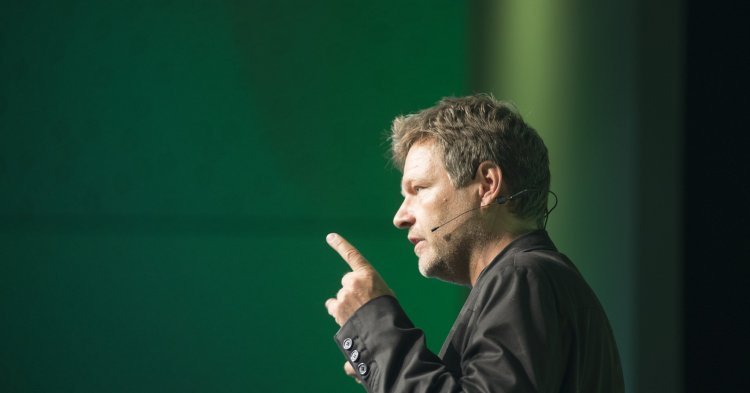Robert Habeck doesn’t wear a tie and he deliberately turns his back on the speaker’s desk. He prefers to walk up and down on stage just like an entertainer. When he talks about issues like his upset with how the EU is handling big tech companies, he can even get quite angry. “How is it possible that Facebook, Google, Amazon, Apple and Microsoft shift their profits and outsmart the European tax system?”, he asks. Following his criticism on the Union’s hesitance with the “frightful five” companies, he advocates for a more consistent attitude of the EU after next year’s elections: “if we were more consistent in tackling legal tax evasion, many other issues could finally be addressed properly.”
Massive changes inside the German political landscape
Back in 2017, more than a few people had put the Greens’ existence into question because all other parties also started to take climate issues seriously. Indeed, the Greens turned out as the smallest party in the German parliament. Still, the political landscape in Germany began to shift after that. In the public opinion, the Liberals clearly were to be blamed for the failure of the “Jamaica” negotiations (between the Conservatives, Greens and Liberals). On the other hand, the Green Party’s readiness to compromise brought about public respect for them. Habeck and his co-chairwoman Annalena Baerbock then strongly rejigged the party’s basic program. This included: no more infighting between the two party wings, coalitional openness to all sides and thinking the economy and ecology together. Politics suitable for the masses.
Synergy effects for other Green parties in Europe?
By now, the programmatic changes along with the weakness of other big parties have taken the Greens from 8.9% in the last federal elections to 23% in the latest surveys. The record-breaking hot summer in Germany this year in addition to Donald Trump’s decision to let the United States pull out of the Paris Agreement have also promoted this development. But does this trend apply to other Green parties in Europe as well? In Scandinavia, the green parties only show one-digit poll numbers by average. In Southern and Eastern Europe, they do not play any significant parliamentary role. The Netherlands is the only exception with recent surveys recording 17 percent for the GroenLinks party. One might say that the Green party’s upswing in Germany is not necessarily trend-setting for Europe as a whole. [1]
But that didn’t stop Robert Habeck from being in his speech in Osnabrück. He praised the EU as the only institution capable of addressing today’s transnational issues in Europe. With that, he also countered the rising tendencies of nationalism. Specifically, he demanded the creation of pan-European social standards as well as the “ecologisation” of the economy inside the common market. Habeck’s bold concepts reflect his perception of an increasingly radical political environment that calls for equally radical responses.
Green politics gain popularity
The Green chairman also took a few questions from the audience. “How would you imagine a future EU foreign policy, especially regarding the tensions between Russia and Ukraine emerging again?”, asked one attentive woman. In his response, Habeck condemned the planned Nord Stream 2 energy supply-line which would go through the Baltic Sea instead of Ukraine: “Like our former state secretary Joschka Fischer has once put it, we need to be concerned about Ukraine and not try to circumvent them.” Yet, Habeck modestly acknowledged “the European Greens probably won’t have much of an influence on these questions.”
Another foreign policy question about the potential inclusion of Balkan countries into the EU by 2025 allowed Habeck to reflect the Union’s mistakes in the past: “In my opinion, we need to learn from our experience with Turkey, which started to develop anti-democratic structures after we failed to keep our promises towards them. Whenever we negotiate with a country to join us, we need to do it authentically.”
By the end of the event, many people from the audience were taking pictures with the Green politician. Katrin Wanninger, a student at the University of Osnabrück, commented the given speech very positively: “He certainly has a special ability to speak to young people. Somehow, his expressions don’t seem outdated.” The Greens will endeavour to maintain the spirit into the upcoming elections.


Follow the comments: |
|
